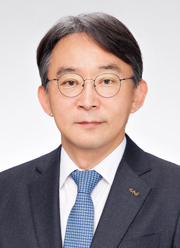

|
|

Financial soundness,
University autonomy and,
Global competitiveness
The chronic financial problems and the arrival of the demographic cliff in college-age population are threatening the very survival of our universities. In addition to these existing problems, the proposed increase in medical school admissions, the slashing of the governmentŌĆÖs R&D budget, the introduction of an open major system, and other emerging issues are rattling our higher education community on a daily basis. At a critical juncture where our entire higher education system may move forward or slip backward, I feel a grave sense of responsibility, representing our universities. In response to the latest issues, we at KCUE will closely communicate with the presidents of our member universities to capture the collective wisdom and consensus of the higher education community, based on which we will engage in a fruitful discussion with the government.
First, KCUE plans to concentrate on resolving the financial crisis that confronts our universities. As long as each universityŌĆÖs decision-making process concerning tuition fees is rational and transparent, the existing regulations regarding university tuitions must be abolished to realize the constitutionally guaranteed autonomy of our universities. In light of this, we will establish a strong partnership with the Ministry of Education (MOE) and drawing on this partnership, use our full capacity to restore the financial soundness of our universities and resolve the tuition impasse.
Second, KCUE will strive to ensure the expansion of financial support for the higher education sector. Since KoreaŌĆÖs strongest assets are its human resources, I believe our national competitiveness is closely aligned with that of our universities. Particularly in a future society that will be shaped by artificial intelligence, goals such as fostering high-quality creative talent, producing meaningful research outcomes in the fields of advanced science and technology, and active cooperation among industry, academia, and research institutions, all of which require collaboration with universities, will hold that much more significance. However, we cannot enhance the competitiveness of our universities without first securing their financial soundness. I will endeavor to come up with fundamental solutions like the enactment of the Higher Education Subsidy Act, which remains a long-cherished desire of our universities and an undertaking demanded by our times.
Third, KCUE will also focus on presenting a successful two-person triangle in line with the government's policy of being open-minded about deregulation. In order to break away from standardized competition, concentrate more capabilities on the global stage, and stand tall as a university that competes with the world, the top prerequisite is to break away from various regulations. KCUE will actively work on creating an environment that can help our universities grow into revered higher education institutions in Asia and the world beyond, on the basis of their respective merits and capacities.
In addition, KCUE will strive to provide our universities with opportunities to strengthen their global competitiveness. KCUE will establish a policy basis for attracting diverse talents so that they do not come to see foreign students as merely a magic solution to their financial problems or the decline of the school-aged population at home.
Keeping in mind that realizing these goals has been a long-standing desire of all of our universities that must be satisfied, I will fulfill my given responsibilities with earnestness and enthusiasm with the spirit of a first-mover laying a foundation stone. I look forward to your continued interest and support for the success of KCUE. I promise to actively communicate with all stakeholders on a continual basis, to help turn the common reality of our universities toward a more positive direction.
Thank you
March 7, 2024
Chairman, Korean Council for University Education
Park Sang-Gue








